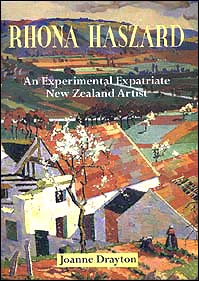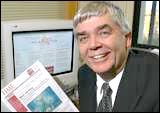Dorothy – 18/7/98
An interview with Robert Clarkson of the New Zealand Friends of Public Broadcasting Inc.
“Why should we pay our broadcasting fee when there has been talk of introducing sponsorship to National Radio and television consists of advertisements joined by snippets of programme?”.
That sort of comment has been made all too frequently in New Zealand in recent months.
During a recent visit to New Zealand Robert McChesney, associate professor at Wisconsin University’s school of journalism and mass communications, expressed surprise at the apparent apathy of New Zealanders when faced with increased commercialism in so many aspects of life, especially public broadcasting.
Not everyone is apathetic Many people do feel stunned into silence by the seemingly unstoppable avalanche of changes in this country, but some people are working very hard to maintain good public service broadcasting which offers informed comment and lively debate. I interviewed two of these people – Robert Clarkson and Denis Dutton.
Taking action to defend public radio In the eighties when the Concert Programme was threatened with sponsorship Robert was involved in The Canterbury Friends of the Concert Programme.
When the government began making noises in the early nineties about selling public radio or putting out programmes on commission to private providers Denis Dutton called a public meeting in Christchurch, and a group called New Zealand Friends of National Radio was formed. Denis was interviewed on national radio and hundreds of people from around the country joined up. The result was a group of several thousand people around New Zealand who were concerned about the state of public broadcasting. The group, now called The New Zealand Friends of Public Broadcasting (NZFPB) continues to work to maintain our right to non-commercial radio and to improve television.
Aims of NZFPB The aim of the group is: ‘to mobilise public opinion so that the unique nature and quality of public service, non-commercial radio in New Zealand is extended to include one television channel.’ New Zealand is the only western democracy that does not have a non-commercial public television channel available to citizens.
On a recent visit to Australia Robert was impressed by the quality of news available in a selection of media. He was able to read from his choice of quality newspapers, such as the Melbourne Age, the Sydney Morning Herald, and The Australian, listen to good radio service and watch a number of television channels, including commercial stations offering good news programmes. This country has far less to offer – in Robert’s view, because of its involvement with the far right philosophies, and the constant consumerism.
Robert’s commitment to the organisation Robert was a foundation member and was made the treasurer. When the group bought a computer and housed it at his home his role trebled to secretary, treasurer and editor of the newsletter. He produces excellent newsletters, including articles from people closely involved in broadcasting and media comment, like Tom Frewen, Paul Smith, Joe Atkinson and Rhys Jones. He has also become a regular spokesperson for the group, being involved in high level discussions with people in broadcasting.
The cost of a non-commercial TV channel The New Zealand public has been clamouring for a non-commercial channel for years. The response from the authorities has always been that it was too expensive for such a small country.
Jenny Shipley as Minister of State Owned Enterprises earlier this year stated this view yet again. When her office was asked what the cost of this channel would be they had no figures available.
Chris Anderson, Chief Executive Officer at TVNZ put the cost at between $80 and $100 million a year to run such a channel. More recently TVNZ has stated that the cost has risen to $140 million. The commercial channel, even with its advertising revenue, costs $100 million.
New Zealand on Air In 1989 with the passing of the Broadcast Act the licence fee has no longer funded only public broadcasting. The licence fees are collected by the New Zealand Broadcasting Commission, now known as New Zealand on Air. The money is distributed by this body. The budget for 1996/7 was $96 million. The cost of collection and administration amounted to $11 million. Of the remaining $85 million television receives nearly half and Radio New Zealand $19.4 million. $12.7 million is paid to Te Mangai Pahi for Maori broadcasting. As the preservation of the language has been promised by the Government surely there should be direct government funding of this group. A case for this has been established by the Privy Council and the Court of Appeal.
New Zealand on Air funds half the locally made television programmes. These programmes are made by private providers, and the privatisation, which was supposed to cut costs in so many areas, again results in higher costs.
If New Zealand on Air was disbanded the administration costs could be reduced and the saving used towards the cost of a non-commercial channel.
An additional $20.00 on the licence fee would bring in a further $18 million dollars towards the non-commercial channel.
One possible option would be for a non-commercial channel to present its own programming from 5 p.m. to 2 a.m. and carry the BBC World feed for the remaining hours.
Why is the non-commercial channel so important? In the Editorial of the Newsletter for June 1997 Robert compiled the list of complaints from members’ letters: * the placement and intrusive nature of advertisements * the incessant use and length of promos * voice-overs intruding over programme credits * news up-dates during the evening, though this is a misnomer * companies sponsoring current affairs programmes * the hyped-up claims made for forthcoming programmes or series * self-promotion of channels * advertisements that sound louder than programmes. Given this list it is small wonder that viewers want a non-commercial channel.
Predominance of advertising With seventeen minutes per hour of advertising, often much louder than the programme, many people turn the sound off during the advertisements and read, converse, or make a cup of tea or coffee. Others record the programme on video so that when they watch it they can fast-forward past the advertisements. This surely is not in the advertisers’ best interests, but it is the logical outcome of advertisement overload. And while we ignore the advertisements we pay for them in the extra cost of the goods we buy – on average $12 per week per household.
The heavy load of advertising is taken away from programme time. The programmes become the enticement to keep the viewer there for the next lot of commercials. Television is becoming just a series of commercials interrupted by programmes.
The emphasis on advertising revenue is resulting in a lot of programming to the lowest common denominator – the dumbing down of television.
People turning to other media National Radio is achieving high ratings, especially for the programmes which deal with issues in depth. Many people want more than infotainment.
Libraries and newspapers report healthy readership.
The growth of interest in the Internet has hurt television as men aged 25 to 55 go off at prime time to be on the Internet. It has made millions of dollars difference to the advertising spent on television in the USA. The Internet allows freedom and choice and for some people largely replaces television. Although there is junk on the Internet, the surfer is in control and chooses what is viewed.
The growth of video shops is further evidence of people moving away from television to entertainment of their choice.
Rhys Jones comments on the influence of the advertisers Rhys Jones in a recent newsletter of NZFPB commented that while the programmes become dumb and forgettable the commercials become more glamorous and memorable.
He also emphasized that any claims from television staff that they give the public what it wants are false. They aim instead to give the advertisers what they want. Ratings are taken, but there is no opportunity to comment. Even when it was clear that the public wanted Horizon television to continue the executives disregarded public opinion as advertisers wanted a channel for the young to advertise products that the young would buy.
There is no choice available by switching channels as they tend all to show the same type of programme at the same hour.
Non commercial television struggles against consumerism Most of us have thought of the BBC as a giant among the media, but even the BBC is cost cutting and struggling to keep up its services. Many of us care about having programmes chosen for quality to extend viewers’ horizons, not to please sponsors’ prejudices and preferences. We grow increasingly irritated by the predominance of advertisements. If we want better services we need to be better informed about the real situation and the work of NZFPB.
Check out NZFPB Website To learn more about NZFPB look at: http://www.fopb.org.nz/ Join in the discussion and better still join this group which is working hard inconspicuously and successfully to improve public broadcasting in this country.
Share your views on the Backchat Conversation about what is on television tends to draw strong views wherever people sit and talk. Please take time to share your views with readers on the Backchat. We look forward to lively discussion.
Read Part 2 of this article – an interview with Denis Dutton.



